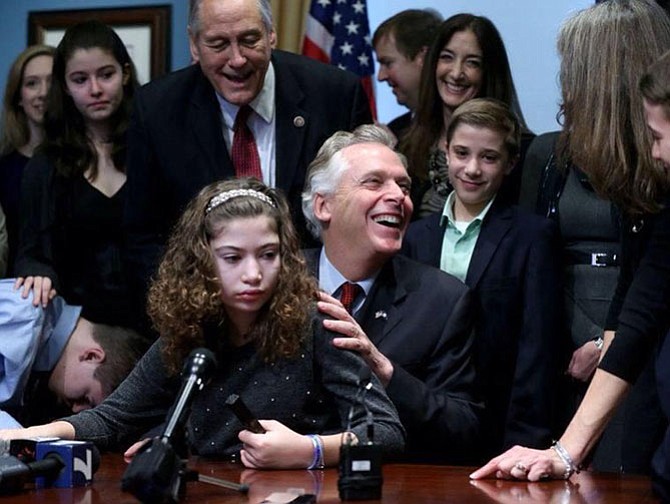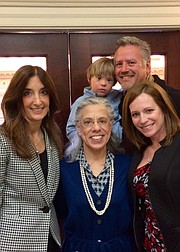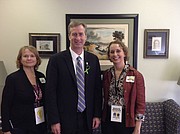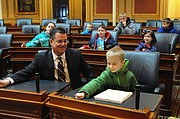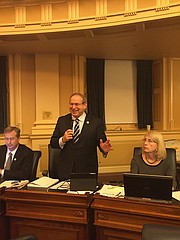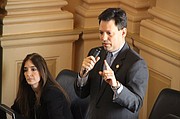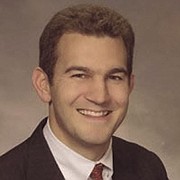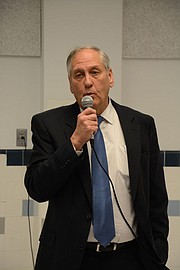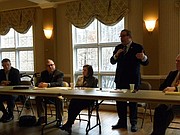Haley Smith jumped into Gov. Terry McAuliffe’s (D) lap as he signed legislation legalizing the use of marijuana extract for medicine to treat epileptic seizures. Photo courtesy of Dave Marsden
The 45-day 2015 session of the Virginia General Assembly came to a close last week, one which Del. Scott Surovell (D-44) described as “pretty calm, mainly because guys on either side have stayed away from divisive social issues they’ve pushed in the past,” and Sen. Toddy Puller (D-36) assessed, “For the most part, I think they did accomplish some good things.”
Surovell was critical of the continued shortness on transportation and education funding, not expanding Medicaid and the absence of movement on congressional redistricting, attributing the election year as a reason “a lot of people on other side didn’t want to deal with big issues.”
The governing body did, however, pass amendments to a two-year budget from last year’s session, two days prior to this year’s close. “An uneven revenue stream has caused us to jump through a lot of different hoops,” said Del. Mark Sickles (R-43).
THOUGH NO LOCAL LAWMAKER saw all of their proposed legislation progress to Gov. Terry McAuliffe’s (D) desk for signing, each at least had numerous causes and concepts they championed take off.
When Del. Eileen Filler-Corn’s (D-41) HB2306, aka “ABLE Act,” passed from the Virginia House and Senate to Gov. McAuliffe for his signature, it was a culmination of a multi-year journey, not just for the delegate but for several of her constituents.
The bill, which would create tax-free savings accounts for individuals with disabilities, is a Virginia version of federal legislation signed into law in December 2014.
Burke resident Stephen Beck had been a passionate advocate for the Achieving a Better Life Experience federal legislation, on behalf of his daughter Natalie who has Down syndrome, as well as the Down Syndrome Society. Beck died in December, after the bill passed one congressional chamber but before it was signed into law.
Prior to the passage of the federal bill, Filler-Corn had been working on similar legislation for Virginia, though it had never progressed to the governor’s desk.
“When I started all this, I didn’t know it was a local connection,” said Filler-Corn, “that the passion was already there for it.”
When the federal ABLE Act, after Beck’s death known as the “Beck Bill,” passed, Filler-Corn knew the time was right to re-introduce her bill at the General Assembly.
Beck’s wife Catherine went down to Richmond for the last week of the session and saw the delegate’s bill move forward.
“It was great, I’m so proud of Eileen,” said Beck. “I’m so happy that she was so proactive in bringing this bill up to everyone’s attention and getting it moved through all the channels.”
Filler-Corn said the bill is about “parity,” assisting individuals with disabilities to have the same savings opportunities -- post-secondary education, housing and job-training -- as those kids without.
Traci and Steve LaGanke took up Stephen Beck’s mantle on behalf of the National Down Syndrome Society, Traci testifying in Richmond each time Filler-Corn’s bill came up. Their son Nicholas also has Down syndrome.
“Traci was invaluable,” said Filler-Corn, “her story was so moving. And Beck was an icon, certainly a trailblazer, with the Down Syndrome Society, in creating these accounts. There was just a lot of outpouring of support.”
With Traci and Catherine standing in the gallery, Filler-Corn was able to have that session adjourn in memory of Stephen Beck.
While the Virginia ABLE Act is waiting to be signed by Gov. McAuliffe, Catherine Beck is already thinking about the next challenge of getting the word out to the public, for citizens to take advantage of the saving opportunity.
“I would love to see, and help in any way, this get implemented in the state of Virginia,” said Beck. “This gives state to go-ahead. OK, now for real, how do we do this.”
Filler-Corn said the structure and resources for the accounts are already in place with the existing Virginia College Savings Plan office. “They can and are willing to do the same for these able accounts,” she said, “with no general fund fiscal impact.”
For more information on Filler-Corn’s legislation and the work of the National Down Syndrome Society, visit www.eileenfillercorn.com and www.ndss.org.
Bills That Made It to Governor’s Desk
Del. David Bulova (D-37) brought forward HB1515, requiring hospitals to provide information to new parents about safe sleep environments for their baby.
“I think back to when I was a brand new parent -- I’m the father of 3 kids,” Bulova said. “We were never given info on that. It really struck me how many babies die needlessly every year. 95 percent of these were preventable.”
Del. Dave Albo’s (R-42) successful HB1445 helps decriminalize medicine extracted from marijuana plants. A bill with potentially wider impact is HB1635, which gives victims of Internet defamation a more “reasonable” amount of time once they file action to find out the identity of the person who posted against them.
“Anybody can be the victim of an Internet defamation,” said Albo. “[The Internet] has given crazy people and people with bad motives the ability to get their message out without having to buy a postage stamp, people who don’t want to put their names by their posts. It’s not gentlemanly to trash people anonymously.”
Del. Mark Sickles (R-43) was responsible for HB2372, which creates an electronic asset verification system for medical assistance applications.
“Prior to this,” Sickles said, “The Department of Medical Assistance Services based applications on what you attested to, trusting your honesty. If you forgot you have another $40 thousand, $200 thousand, this will give a chance to find it within seconds. It’s expected to save the state a few hundred-thousand dollars.”
Del. Scott Surovell’s (D-44) HB1684, that would have allowed students with a strong score on Advanced Placement or International Baccalaureate exams to waive the related Virginia Standards of Learning test, was folded into other legislation awaiting McAuliffe’s signature that gives localities more discretion for the waivers.
“This will save students a lot of unnecessary testing so they can focus on other matters other than memorizing material for an SOL,” said Surovell.
Sen. Chap Petersen (D-34) drafted SB965 with ambitious intent to limit law enforcement’s ability to collect data on citizens -- specifically through license plate-reading technology -- without proven just cause, an investigation or a warrant.
“We’ve effectively outlawed that,” said Petersen. “Law enforcement saw it as a tool to help solve crime, that they should collect information that may be relevant at a later time. But there has to be limits on it. Government really can’t scrutinze or follow individuals without some kind of basis.”
Sen. George Barker (D-39) and Del. James M LeMunyon (R-67) had identical legislation (SB1122 and HB1715, respectively) pass both bodies that requires Virginia colleges to immediately notify parents and proactively handle suicide risks on campus with a coordinated support network involving the student, friends, health or counseling centers on campus, and parents. Barker has worked on similar bills for the last several years, spurred by the suicide of Virginia Tech student and Fairfax County resident Daniel Kim. Virginia Tech created its own policy for reporting suicide risks to parents, but not all Virginia universities followed suit.
“Universities resisted for several weeks on things,” said Barker. “They acknowledged it was an issue, but said we want to think about it for awhile and talk about it later. We’ve been talking about this for a couple years and haven’t gotten anywhere yet. Rather than putting it off, let’s move it. We finally proposed some language to help it move forward.”
Sen. Dave Marsden (D-37) saw McAuliffe sign his SB1235 along with Dave Albo’s HB1445: Both effectively decriminalize the possession and use of marijuana plant extracts as medicine.
“It was a powerful exp for all of us,” said Marsden. “Before I could walk into the bill signing room, I had to get my emotions under control, just to realize you’re doing something that’s going to impact thousands of kids. Virginia being conservative case that it is, the legalization of marijuana is something people didn’t want to talk about. Finally science won out over fear.”
Sen. Toddy Puller (D-36) was disappointed to see the House of Delegates kill her veterans special docket bill SB903, however SB675 and SB676 were successful, facilitating creation of two veterans care and assisted living facilities with over $60 million in federal funding.
“Veterans, they’re not getting any younger,” said Puller. “This will be a way to take care of them the rest of their lives. It’s very important that it be available.”
More like this story
- Delegates, senators and Fairfax County community leaders reflect on priorities for the General Assembly
- Burke, Fairfax: Del. Eileen Filler-Corn, Natalie Beck Serve as Co-Grand Marshals of the Buddy Walk
- Burke and Springfield: Saving ABLE Savings Accounts
- Dead or Alive: Virginia General Assembly Lawmakers Pick Their Legislative Highlights at the Crossover
- Burke, Fairfax: Del. Filler-Corn and the Beck Family Participate in NASCAR Event
